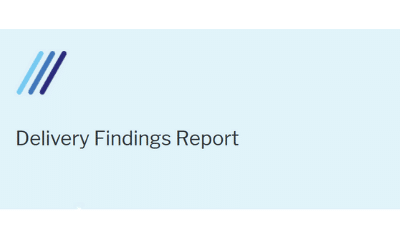An inclusive, net zero carbon economy remains at heart of the strategy
KEY RECOMMENDATIONS
• Giving an independent, specialist body the remit to provide strategic, long-term infrastructure advice to Scottish Government
• Enshrining the Place Principle and implementing a one public sector approach to planning and developing sustainable places
• Establishing a Construction Accord to strengthen the future relationship between the public sector and the construction industry
An independent, specialist body to provide strategic long-term infrastructure advice is considered pivotal to effectively delivering Scotland’s inclusive, net-zero carbon economy, according to a final report by the Infrastructure Commission for Scotland (ICS) presented to Scottish Government.
Enshrining the Place Principle and implementing a one public sector approach to planning and developing sustainable places are also key recommendations in the report.
The establishment of a Construction Accord to strengthen the future relationship between the public sector and the construction industry, is another vital recommendation in the Commission’s report.
Published today, the ICS’s report, ‘Delivery Findings – A blueprint for Scotland’ builds on the ICS’s initial ‘Key Findings’ report published in January 2020 and follows a further period of extensive stakeholder engagement, both pre and during the COVID-19 pandemic. Its focus remains the delivery of an inclusive, net-zero carbon economy, the importance of which has only been amplified by the COVID-19 pandemic.
To achieve this, the ICS recommends that by early 2021 an independent specialist body be given the responsibility by Scottish Government to help prioritise the infrastructure needed to enable an inclusive, net-zero carbon economy and to develop a 30-year infrastructure strategy that is reinforced by a long-term needs assessment.
The independent organisation would sit outside the political decision-making system to enable it to operate in an arms-length and transparent way – one that builds confidence across the public and private sectors as well as society and the general public. This would allow the body to challenge Government while also undertaking tactical public engagement to inform the long-term strategy.
Among other ICS’ recommendations is that Scottish Government should enshrine the use by all stakeholders of the Place Principle which has already been proven to be an effective model when designing places within planning practice. This would support the creation of sustainable places and help enable a “one public sector approach” to infrastructure which is central to achieving the Commission’s vision for a net zero carbon and inclusive growth economy.
The ICS also recognises the importance of a thriving construction sector being vital for the successful delivery of Scotland’s long-term infrastructure requirements. While work is already underway to drive positive outcomes to increase productivity, raise capability and improve the reputation of the construction sector, the ICS notes that in light of the impact the covid pandemic has had across the economy, there is a window of opportunity for both the public and construction sectors to strengthen their future working relationship and practice.
As part of this, the ICS recommends that by early 2021, Scottish Government and the Construction Scotland Leadership Group should create a Construction Accord. This would underline the vision and set a commitment to improve conditions that support a high performing construction sector. It would include measures to improve the capacity, capability and diversity of the workforce at all levels with a heavy focus on skills development, training requirements and career prospects for those working in the sector.
Ian Russell, chair of the Infrastructure Commission for Scotland, said: “Infrastructure has a vital role to play in the delivery of an inclusive, net zero carbon economy and COVID-19 has amplified the need for urgent action and change for economic, social and natural infrastructure.
“The Commission is recommending that an independent, specialist body be given responsibility for providing Government with strategic, long-term infrastructure advice and enshrining the place principle within planning practice. Collaboration between the public sector and the construction industry is crucial and therefore establishing a construction accord between the public sector and the construction industry is another vital recommendation in the Commission’s report.”
Other recommendations in the report include harnessing a heightened focus on digital technology. Recognising the critical and increasing importance of high-quality data to infrastructure assets of all types, the ICS advises that a digital data co-ordination, standards and facilitation role is established by the end of 2021 to support the efficient and innovative development and use of data for the infrastructure sector.
Cabinet Secretary for infrastructure, Michael Matheson, said: “The Covid-19 pandemic has been an unprecedented global crisis which has fundamentally changed every aspect of our lives. Infrastructure will play a critical role in the years ahead as we plan our strategic economic recovery from the pandemic.
“I am grateful to the Infrastructure Commission for their hard work – no doubt made more challenging in recent months – to produce this comprehensive second report on the delivery of infrastructure. We shall now take time to consider its findings very carefully.
“The Commission’s Phase 1 report has already helped to shape our next 5 year Infrastructure Investment Plan, details of which I look forward to announcing in September. This Plan will incorporate a response to the Commission’s Phase 1 findings.”
The ICS, which was established in early 2019 to develop Scotland’s infrastructure strategy for the next 30 years, recognised net zero carbon and an inclusive growth economy as two overarching policies that were priorities on both a national and global scale. As such, these priorities were placed at the heart of its work and mark a sharp shift from the broad aim of overall policy convention to maximise GDP over the last 50 years.
The Commission was asked to provide advice to ministers on the possible creation of a Scottish National Infrastructure Company. After careful consideration, the Commission has concluded from its work that none of the outcomes of its recommendations would be enhanced by creation of a Scottish National Infrastructure Company.
On concluding its work, which is believed to be the first of its kind for Scotland, Chair of the Commission, Ian Russell, stated: “We are clear that the implementation of all of the recommendations made in our Phase 1 and Phase 2 reports – some of which we acknowledge will necessitate a fundamentally different way of prioritising, planning and delivering infrastructure investment – will make a significant contribution to the successful creation of an inclusive net zero carbon economy.
“The recommendations from the Commission’s work over the past 18 months are designed to galvanise and accelerate action by all involved with infrastructure in Scotland.”






